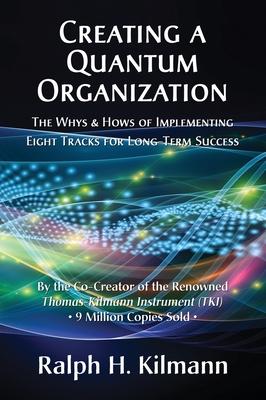Creating a Quantum Organization presents everything that I have ever created - and integrated - during the past 50 years on those four timeless topics: conflict management, change management, expanding consciousness, and quantum transformation. Essentially, in my "legacy book," I address how managers and members can transform their outdated, sluggish, ineffective, and unfulfilling Newtonian organizations into vibrant, effective, and meaningful quantum organizations. I name this mega challenge: Quantum Transformation.
Creating a Quantum Organization is organized into 12 chapters that include a total of 167 elegant illustrations - which take full advantage of the old adage: "A picture is worth a thousand words."
In Chapter 1, I present several "Big Pictures," also known as the Complex Hologram and the Quantum Wheel, which dramatically reveal all the interrelationships among systems, processes, and people - both inside and outside an organization.
Chapter 2 and 3 investigate the essence of conflict management and change management - since conflict and change comprise two sides of the same coin. You can't have one without the other: Change creates conflict and resolving conflict creates change. The material on the Thomas-Kilmann Instrument (TKI) along with the Kilmann Organizational Conflict Instrument (KOCI) allows us to assess the self-defeating conflicts that members have with their surrounding systems and processes. Examining such "systems conflicts" will enable us to pinpoint the barriers to long-term success before attempting to implement a completely integrated program of eight tracks that's intended to transform those Newtonian "barriers to success" into quantum "channels for success."
Chapter by chapter, I then present the most relevant and practical material for each of the eight tracks: culture, skills, teams, strategy-structures, reward systems, and the three process improvement tracks. Indeed, any program of change or set of change initiatives that implements these eight tracks out of sequence, or fails to address all eight tracks in their entirety, will inadvertently prevent people and their organizations from realizing their dreams.
In Chapter 11, I address the future of organizational development and quantum transformation by exploring how to expand the mind/body/spirit consciousness of all members - and then bring that expanded consciousness into the workplace.
For the millions of dedicated fans of the renowned Thomas-Kilmann Instrument (TKI), Creating a Quantum Organization makes explicit - and extensive - use of the TKI Conflict Model in virtually every chapter in the book. As a result, you're bound to learn many more illuminating applications of the TKI Conflict Model than you ever thought possible. In addition, you'll develop a deeper appreciation for when to use each of the five conflict modes and how the three diagonal dimensions on the TKI Conflict Model (i.e., the protective, distributive, and the integrative dimensions) can shed additional light on the various short-term and long-term consequences of using one or more of the five conflict modes in any given situation.
